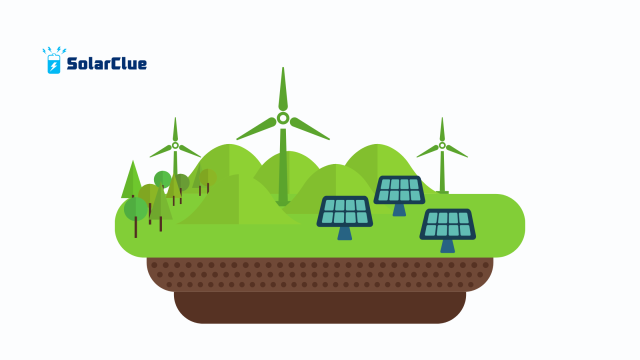Why Renewable Energy Matters for a Sustainable Future
To understand the importance of this topic, we must start with a basic question: what is renewable energy? Renewable energy refers to power sourced from resources that are naturally replenished—such as sunlight, wind, rain, tides, waves, and geothermal heat. These sources are inherently sustainable and cause far less environmental harm compared to fossil fuels like coal and oil. Switching to renewable energy reduces greenhouse gas emissions, combats climate change, and promotes healthier ecosystems. It’s a step forward in protecting both the planet and future generations.
Table of Contents
- 1 Types of Renewable Energy
- 2 Renewable Energy in India
- 3 Solar Power System: The Game-Changer
- 4 Benefits of Solar Power
- 5 Environmental Benefits
- 6 Economic Opportunities
- 7 Challenges and Limitations
- 8 Government Initiatives in India
- 9 How You Can Make a Difference
- 10 Future of Renewable Energy
- 11 Conclusion
- 12 FAQs
Types of Renewable Energy
There are several major types of renewable energy, each contributing to the goal of a cleaner, greener Earth:
1. Solar Energy: Captured using photovoltaic cells that convert sunlight into electricity. It’s one of the most accessible and widely used sources.
2. Wind Energy: Generated through wind turbines that transform kinetic wind power into usable electricity.
3. Hydropower: Utilizes flowing water, typically from rivers or dams, to generate energy.
4. Biomass Energy: Produced from organic materials such as wood, agricultural residues, and animal waste.
5. Geothermal Energy: Taps into the Earth’s internal heat to generate power and provide heating solutions.
Each of these technologies brings unique strengths, and when combined, they offer a robust and scalable solution to the world’s growing energy needs.
Renewable Energy in India
The conversation about renewable energy in India is particularly important. As one of the fastest-growing economies and home to over 1.4 billion people, India’s energy needs are immense. Fortunately, the country is taking bold steps toward sustainability. It ranks among the top five nations globally for installed renewable energy capacity. India has launched initiatives like the National Solar Mission and is a founding member of the International Solar Alliance. From vast wind farms in Tamil Nadu to solar parks in Gujarat and Rajasthan, India is embracing clean energy like never before.
Solar Power System: The Game-Changer

Among the various renewable technologies, the solar power system stands out for its simplicity, accessibility, and scalability. A solar power system typically consists of solar panels, an inverter, batteries, and other supporting components. These systems can be installed on rooftops, in fields, or even integrated into building designs. For many homeowners and businesses, it offers an opportunity to reduce electricity bills, increase energy independence, and support environmental goals. It also plays a vital role in remote areas where grid access is limited or unavailable.
Benefits of Solar Power
There’s a reason why solar power is becoming a household term. It brings several benefits:
1. Cost savings: Once installed, solar panels significantly lower monthly energy costs.
2. Low maintenance: Solar systems require minimal upkeep and are built to last 20–25 years or more.
3. Energy independence: Households and businesses can produce their own electricity and rely less on the traditional grid.
4. Government support: Incentives, rebates, and subsidies make solar more affordable.
In a country like India, with abundant sunshine year-round, solar energy holds exceptional promise.
Environmental Benefits
The switch to renewable energy has far-reaching environmental implications. Unlike fossil fuels, renewables emit little to no pollutants. This leads to improved air quality, reduced water usage, and less strain on natural ecosystems. For instance, adopting solar power systems helps in significantly reducing carbon dioxide emissions, a major contributor to global warming. Cleaner energy means healthier lives and a more stable climate.
Economic Opportunities
Besides its environmental upside, renewable energy is a powerful economic catalyst. It creates jobs in manufacturing, installation, research, and maintenance. In fact, the clean energy sector has been one of the fastest-growing employment areas globally. As investments in solar, wind, and hydro technologies increase, so do the opportunities for skilled labor and entrepreneurship. It’s a win-win for the economy and the environment.
Challenges and Limitations
While the future looks bright, there are challenges to overcome:
1. Initial cost: Though prices have dropped significantly, the upfront cost of a solar power system or wind turbine can still be a barrier for some.
2. Energy storage: Technologies like batteries are still evolving, especially for storing solar and wind energy efficiently.
3. Intermittency: Renewables depend on nature—sunlight and wind aren’t always available on demand.
4. Grid infrastructure: Adapting old grids to accommodate new sources is complex and costly.
However, with government support and technological innovation, these obstacles are being addressed rapidly.
Government Initiatives in India
India’s government is playing a vital role in promoting renewable energy in India. Key initiatives include:
1. National Solar Mission: Aims to deploy 100 GW of solar capacity across the country.
2. Subsidies: Rooftop solar power systems are eligible for up to 40% subsidy in some states.
3. Policies and reforms: Ease of doing business, streamlined approvals, and investment-friendly laws are attracting global interest.
With supportive policies, India is well on its way to becoming a renewable energy superpower.
How You Can Make a Difference
You don’t have to be a policymaker to contribute. Every individual can play a part:
1. Install solar panels at your home or office.
2. Conserve energy by using energy-efficient appliances.
3. Spread awareness about the benefits of renewable energy.
4. Support green businesses and vote for climate-friendly policies.
To learn how to get started with your own solar power system, check out solarclue.com for reliable and affordable options.
Future of Renewable Energy
Looking ahead, the future of renewable energy is filled with potential. Advances in AI, smart grids, and energy storage are making clean energy more efficient and accessible. The global shift towards sustainability is not a trend but a necessity. As we innovate and adapt, the transition will only accelerate. India, with its ambitious targets and growing awareness, is well-positioned to lead this change.
Conclusion
In summary, renewable energy is not just a solution—it is the solution. Whether it’s fighting climate change, reducing energy costs, or creating new jobs, the benefits are undeniable. With growing adoption of solar power systems, supportive policies, and individual action, a sustainable future is within reach. Ready to explore the world of solar and green energy? Start your journey at blog.solarclue.com and discover how you can be part of the energy revolution. The sun is rising on a cleaner, greener world—don’t miss it!
FAQs
1. What is renewable energy and why does it matter?
Renewable energy comes from natural sources like sunlight and wind, which are eco-friendly and help combat climate change.
2. What are the main types of renewable energy?
The major types of renewable energy include solar, wind, hydro, biomass, and geothermal energy.
3. Why is renewable energy important for India?
Renewable energy in India is essential for meeting rising energy demand, reducing pollution, and creating jobs.
4. What are the advantages of solar power systems?
A solar power system reduces electricity bills, lowers carbon footprints, and increases energy independence.
5. How can I get started with solar energy?
Visit solarclue.com to explore solar products and installation services tailored for you.
💡 Ready to shine with clean energy? Visit solarclue.com now and make the sun work for you in the smartest way possible!




